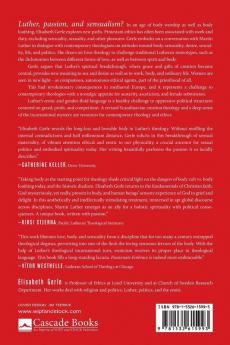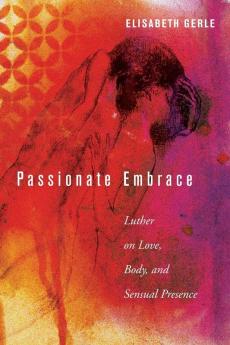English
Paperback
₹3072
₹3413
9.99% OFF
(All inclusive*)
Delivery Options
Please enter pincode to check delivery time.
*COD & Shipping Charges may apply on certain items.
Review final details at checkout.
Looking to place a bulk order? SUBMIT DETAILS
About The Book
Description
Author
Luther passion and sensualism? In an age of body worship as well as body loathing Elisabeth Gerle explores new paths. Protestant ethics has often been associated with work and duty excluding sensuality sexuality and other pleasures. Gerle embarks on a conversation with Martin Luther in dialogue with contemporary theologians on attitudes toward body sensuality desire sexuality life and politics. She draws on Eros theology to challenge traditional Lutheran stereotypes such as the dichotomies between different forms of love as well as between spirit and body. Gerle argues that Luthers spiritual breakthrough where grace and gifts of creation became central provides new meaning to sex and desire as well as to work body and ordinary life. Women are seen in new light--as companions autonomous ethical agents part of the priesthood of all. This had revolutionary consequences in medieval Europe and it represents a challenge to contemporary theologies with a nostalgic appetite for austerity asceticism and female submission. Luthers erotic and gender-fluid language is a healthy challenge to oppressive political structures centered on greed profit and competition. A revised Scandinavian creation theology and a deep sense of the incarnational mystery are resources for contemporary theology and ethics. FOR BACK COVER: Elisabeth Gerle reveals the long-lost and lovable body in Luthers theology. Without muffling the internal contradictions and half-millennium distance Gerle solicits in this breakthrough of sensual materiality of vibrant attention ethical and erotic to our physicality a crucial ancestor for sexual politics and embodied spirituality today. Her writing beautifully performs the passion it so lucidly describes. --Catherine Keller Drew University Taking body as the starting point for theology sheds critical light on the dangers of body cult vs. body loathing today and the historic dualism with its many tentacles. Elisabeth Gerle returns to the fundamentals of Christian faith: God mysteriously yet really present in body and human beings sensory experience of God in grief and delight. In this aesthetically and intellectually stimulating treatment immersed in apt global discourse across disciplines Martin Luther emerges as an ally for a holistic spirituality with political consequences. A unique book written with passion. --Kirsi Stjerna Pacific Lutheran Theological Seminary Lund ethicist Elisabeth Gerles enchanting voice comes as a gift to the North American public. Gerle recovers Luthers truly original theological genius in bringing to the fore the implications of the Reformers view of God in the passions of the flesh. This work liberates love body and sensuality from a discipline that for too many a century entrapped theological dogmas perverting into sins of the flesh the loving sensuous fervors of the body. With the help of Luthers theological incarnational turn eroticism receives its proper place in theological language. This book fills a long-standing lacuna. Passionate Embrace is indeed most embraceable. --Vitor Westhelle author of Eschatology and Space: The Lost Dimension in Theology Past and Present FOR FRONT MATTER: In an age where the body of knowledge on Reformation and Transformation is actually characterized by dis-embodiedness Elisabeth Gerle provides us with this book about Transformative Passion. In a critical dialogue with Luther and contemporary theologians she expands our thinking on Love Body and Sensual Presence that challenges nostalgic theological trends dreaming of the past. --Sarojini Nadar Desmond Tutu Research Chair University of the Western Cape With the instincts of a jazz singer Gerle weaves feminist Lutheran and eros theologies together with political theory and ethics. Intentionally breaking the rules of patriarchal texts her non-linear writing is designed to entice and evoke. Gerles deep broad resear
Delivery Options
Please enter pincode to check delivery time.
*COD & Shipping Charges may apply on certain items.
Review final details at checkout.
Details
ISBN 13
9781532615993
Publication Date
-12-05-2017
Pages
-338
Weight
-459 grams
Dimensions
-152x229x19.18 mm











